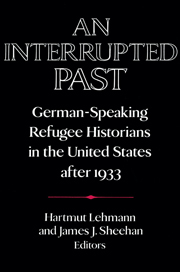Book contents
- Frontmatter
- Introduction
- PART I: Introduction
- 1 German and American Historiography in the Nineteenth and Twentieth Centuries
- 2 German Historiography during the Weimar Republic and the Émigré Historians
- 3 The Historical Seminar of the University of Berlin in the Twenties
- PART II: Introduction
- 4 Refugee Historians in America: Preemigration Germany to 1939
- 5 “Uphill Work”: The German Refugee Historians and American Institutions of Higher Learning
- 6 Everyday Life and Emigration: The Role of Women
- 7 The Special Case of Austrian Refugee Historians
- 8 Schicksalsgeschichte: Refugee Historians in the United States
- 9 German Historians in the Office of Strategic Services
- 10 The Refugee Scholar as Intellectual Educator: A Student's Recollections
- PART III: Introduction
- 11 German Émigré Historians in America: The Fifties, Sixties, and Seventies
- 12 The Americanization of Hajo Holborn
- 13 Explaining History: Hans Rosenberg
- 14 Ernst Kantorowicz and Theodor E. Mommsen
- 15 Refugee Historians and the German Historical Profession between 1950 and 1970
- Conclusion
- Index
4 - Refugee Historians in America: Preemigration Germany to 1939
Published online by Cambridge University Press: 05 January 2013
- Frontmatter
- Introduction
- PART I: Introduction
- 1 German and American Historiography in the Nineteenth and Twentieth Centuries
- 2 German Historiography during the Weimar Republic and the Émigré Historians
- 3 The Historical Seminar of the University of Berlin in the Twenties
- PART II: Introduction
- 4 Refugee Historians in America: Preemigration Germany to 1939
- 5 “Uphill Work”: The German Refugee Historians and American Institutions of Higher Learning
- 6 Everyday Life and Emigration: The Role of Women
- 7 The Special Case of Austrian Refugee Historians
- 8 Schicksalsgeschichte: Refugee Historians in the United States
- 9 German Historians in the Office of Strategic Services
- 10 The Refugee Scholar as Intellectual Educator: A Student's Recollections
- PART III: Introduction
- 11 German Émigré Historians in America: The Fifties, Sixties, and Seventies
- 12 The Americanization of Hajo Holborn
- 13 Explaining History: Hans Rosenberg
- 14 Ernst Kantorowicz and Theodor E. Mommsen
- 15 Refugee Historians and the German Historical Profession between 1950 and 1970
- Conclusion
- Index
Summary
Two types of university historians were forced from their teaching and research positions, and into exile, by the National Socialist regime: first, non-Jews of a left-liberal or Marxist persuasion, and second, Jews. A third, mixed, type was derivative: Leftist Jews were at risk both for their racial background and for their ideology. This combination was historically grounded. Characteristically, left-wing politics had accompanied the emancipation of Jews in Germany since the Enlightenment and had in fact marked the noticeably greater access of Jewish candidates to university posts in the comparatively tolerant climate of the Weimar republic.
The emigration of leftist and Jewish academics was preceded by official legislation, but in certain cases it received a significant boost from semiprivately organized, and sometimes altogether spontaneous, harrassment. Proscriptive legislation against Jews and Marxists proceeded in three major steps. First came the Law for the Restoration of the German Civil Service, which, on April 7, 1933, deprived both politically unreliable and non-“Aryan” university personnel of their civil-service status, canceling their tenure privileges and dismissing them, with few, albeit notable, exceptions.
- Type
- Chapter
- Information
- An Interrupted PastGerman-Speaking Refugee Historians in the United States after 1933, pp. 73 - 93Publisher: Cambridge University PressPrint publication year: 1991
- 3
- Cited by



